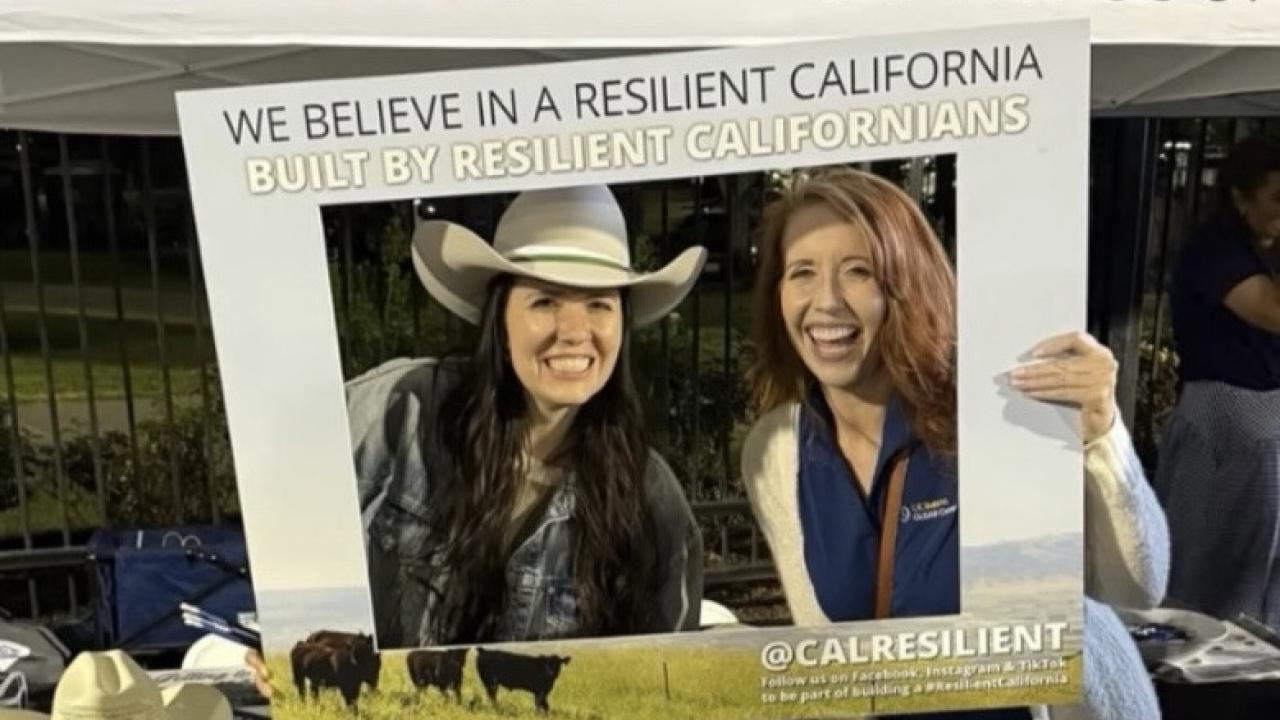
Bridging the Gap: How the CLEAR Center is Connecting Agriculture, Science, and the Public
When Tracy Sellers joined the California Cattlemen’s Association’s (CCA) Sorting Pen podcast this fall, host and CCA Communications Director, Katie Roberti introduced her as someone who has spent a career helping the public better understand where their food comes from. It’s a simple phrase that captures a complicated mission—one Sellers has built her career around.
Today, Sellers is a writer and communications specialist at UC Davis’s CLEAR Center—CLEAR stands for Clarity and Leadership for Environmental Awareness and Research—where she helps bridge the gap between scientists, producers, and the public on issues that shape the future of agriculture. But her journey to that role started far from the farm.
“I grew up in the Bay Area and wanted to work in TV news,” Sellers said. “I didn’t have any ties to ag at all.”
After college, she worked at a few Sacramento TV stations before spotting a job at the California Farm Bureau for a new “farm-to-fork” show, California Country.
“They actually wanted someone without an ag background,” she said with a laugh. “The goal was to ask the questions urban or consumer audiences would ask.”
That fresh perspective proved to be a great fit. Over the next two decades, Sellers helped shape California Country into California Bountiful, serving as writer, photographer, executive producer and on-air host—telling the stories behind California’s farms and ranches. The show, along with its companion magazine, celebrated the people and stories behind California’s farms and ranches.
“Farmers and ranchers are honest and transparent and resilient—and above all, kind,” Sellers said. “They were always generous with their time in explaining what they did and why they did it. That helped me tell the best stories I could about them.”
Her work often meant spending full days on farms, learning by doing—riding camels, harvesting artichokes, or helping milk cows. It was a hands-on education in agriculture and in storytelling. “In TV news, you might spend 10 minutes with someone,” she said. “With California Bountiful, we could spend a day or two and really immerse ourselves in their world. I learned something every time I went out.”
Sellers didn’t just tell the stories of farmers and ranchers—she also helped them tell their own. At the Farm Bureau, she co-led media training sessions across the state to help producers gain confidence in front of the camera and share their perspectives directly with the public.
“Who’s really prepared to have a camera in their face and answer questions?” she said. “But we need more voices out there explaining what agriculture is about. There’s strength in numbers, and there’s strength in more voices being heard and telling the story of agriculture.”
That philosophy—empower people with information and confidence—follows her into her current role at UC Davis.
Finding Clarity in Research
After two decades of fieldwork and storytelling, Sellers joined UC Davis’s CLEAR Center, drawn by the opportunity to connect agriculture and science on a deeper level.
“I started following the CLEAR Center’s work on social media,” she said. “They were tackling the same conversations we’d had at the Farm Bureau about sustainability but adding the research angle. I thought that was fascinating—and something more people should know about.”
Now, as part of a small but dynamic communications team, Sellers helps translate complex research into clear, accessible language for farmers, policymakers, and the public.
The CLEAR Center—led by UC Davis air-quality expert Dr. Frank Mitloehner—focuses on science-based approaches to environmental stewardship in animal agriculture. Its work includes everything from exploring feed additives that reduce methane emissions to understanding livestock behavior, to manure management to heat stress, and animal welfare.
“Our students and professors are doing incredible work,” Sellers said. “Our job is to communicate that — not just to other scientists, but to the public. We want people to understand the science behind sustainability.”
At the heart of that mission is clarity — and that’s where Sellers’ experience comes in. “There are so many opinions about agriculture, and everyone’s entitled to theirs,” she said. “But our focus is communicating from a science-based perspective.”
The CLEAR Center team, she explained, brings together researchers, communicators, and creative specialists who all share a passion for agriculture. “Frank does an amazing job breaking down complex, hard-to-understand science into digestible, relatable language — pun intended,” she laughed. “Joe Proudman, our associate director of communications, helps shape our messaging, while our videographer and digital specialist bring stories to life creatively and visually. It’s a great team to be part of.”
Sellers added that “No two days are alike. I could be writing about a new research project one day and coordinating an event or setting up a podcast episode the next.”
Sellers also said that the effort to effectively communicate the research --both a scientific and human story — is one built on the dedication of UC Davis students and researchers who are constantly pushing to improve the data and deepen understanding.
“The students are incredible,” she said. “They work long hours on the dairy, and feedlots, and in the lab —because they care about getting it right. Their attention to detail, their drive to understand every piece of data, is what makes the science strong.”
That passion, Sellers said, sets the tone for the CLEAR Center’s communications efforts. “We try to match that same level of dedication in how we share their work.”
Research with Real-World Impact
Roberti inquired about how important farmers and ranchers are to the CLEAR Center.
For Sellers, one of the most exciting parts of working at the CLEAR Center is seeing how UC Davis research connects directly to farmers and ranchers on the ground.
“Farmers and ranchers are everything to the work we do,” she said. “Our goal is to have real-world impact—and we can’t do that without them.”
The Center’s research on feed additives, for example, looks at ways to reduce methane emissions from livestock throughout their entire life cycle. Other projects explore gene-editing tools like CRISPR to improve animal welfare, or how artificial intelligence can monitor the health and safety of piglets.
She particularly enjoys talking to researchers about their motivations—the “why” behind the science.
“One of our researchers, Dr. Kristina Horback, studies cattle behavior and grazing patterns. She told me that growing up in the Bay Area, she was always curious why some cows were up on the hills and others were down below. Now she’s made that curiosity her life’s work,” Sellers said. “That’s the kind of story I love.”
That’s exactly what Sellers and her colleagues strive to do at the CLEAR Center. From California dairies using methane digesters to North Carolina pig farmers recycling manure into fertilizer, their work highlights the innovations and dedication behind modern animal agriculture.
“Farmers and ranchers are the original conservationists,” she said. “No one knows their land better, and no one cares more about it. Our job is to share that with the public.”
Roberti then inquired about one of Sellers’ favorite stories while at the CLEAR Center and Sellers told the story of profiling a pigfarmer in Hawaii—a former restaurateur who turned to agriculture to preserve his cultural heritage.
“He literally learned, in part, how to farm pigs by watching YouTube videos,” she said, laughing. “But he’s doing incredible work—rotational grazing, improving animal welfare, feeding his pigs macadamia nuts! These are the kinds of stories that show how innovative and creative farmers can be.”
For Sellers, those human connections are what make agricultural storytelling meaningful. “When people hear ‘commodities,’ they don’t always see the people behind them,” she said. “Putting a face to those stories changes everything.”
Connecting Consumers and Producers
That’s why Sellers believes communication is one of agriculture’s most powerful tools.
She told Roberti that, “With fewer people living or working on farms, many don’t understand how food is produced,” she said. “Ag communicators like us need to connect the dots by telling accurate, engaging stories about modern agriculture.”
Events like Salute to Ag Game at UC Davis help make those connections tangible. This year’s football game celebrated California agriculture with a tailgate barbecue, a petting zoo, and agricultural organizations tabling at the event. “It was so much fun to see people learning, asking questions, and realizing why UC Davis’s team is called the Aggies,” Sellers said.
The CLEAR Center also continues those conversations year-round—hosting its annual State of the Science Summit each spring and, more recently, launching a new podcast called Clear Conversations, co-hosted by Sellers and Dr. Mitloehner.
“It’s another way to tell the story and share the science behind animal agriculture,” she said. “Sometimes it’s an explainer about methane digesters, other times it’s a conversation about new research or current issues. People just want clear, reliable information, and that’s what we aim to give them.”
Looking back, Sellers sees her career as a bridge — between agriculture and the public, between science and storytelling. “If people don’t understand, they won’t care,” she said simply. “That’s why making complex information relatable is so important.”
Whether she’s writing about cutting-edge research or interviewing a rancher halfway around the country, Sellers keeps the same mission in mind: to tell real stories about real people — and in doing so, help others see agriculture in a new light.
“Transparency builds trust,” she said. “That’s what we’re all about at the CLEAR Center. We’re proud of the relationships we’ve built with farmers and ranchers, and we’ll keep doing everything we can to share their stories — because their work truly feeds us all.”
Listen to the entire podcast episode here:
